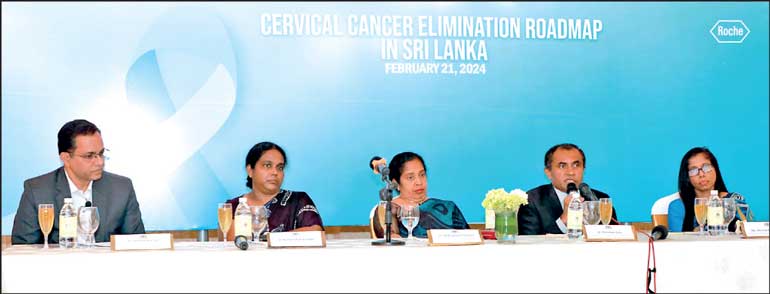Friday Feb 20, 2026
Friday Feb 20, 2026
Tuesday, 5 March 2024 00:02 - - {{hitsCtrl.values.hits}}

From left: Dr. Sandeep Sewlikar, Dr. Ramani Punchihewa, Dr. Chithramalee de Silva, Dr. Padmaka Silva and Nirmali Samaratunga
By Tania de Silva
In a significant stride towards public health and cancer prevention, Sri Lanka recently witnessed a landmark panel discussion focusing on the critical issue of cervical cancer, the second most prevalent cancer among women in the nation. This disease, posing a significant public health challenge, has prompted urgent and unified efforts towards early detection and comprehensive care.
Organised by Roche Diagnostics Sri Lanka, the event drew together esteemed experts in the field of medicine and public health. They shared invaluable insights and findings from recent initiatives aimed at the elimination of cervical cancer within the country, marking a pivotal moment in Sri Lanka’s health sector dialogue. Cervical cancer ranks as the second most common cancer among women in Sri Lanka, accounting for an estimated 1,407 diagnoses and 780 deaths each year. Without intervention, projections forecast a potential death toll of 58,754 by 2070 and 115,137 by 2120.
The panel discussion featured prominent figures, including Maternal and Child Health Director and Consultant Community Physician Dr. Chithramalee de Silva, National Hospital for Respiratory Disease Consultant Histopathologist Dr. Ramani Punchihewa, Well Woman Program National Program Manager and Consultant Community Physician Dr. J. Padmaka Silva, and Dr. Sandeep Sewlikar from Roche Diagnostics. Their collective wisdom highlighted the progress and the challenges in the ongoing fight against cervical cancer.
A significant focus of the dialogue was the encouraging results from a pilot project conducted in Kalutara. This initiative underscored the superiority of HPV DNA testing over traditional screening methods in early detection, showcasing a promising avenue for lowering cervical cancer rates across Sri Lanka. “The findings showcased that the Cervical Intraepithelial Neoplasia (CIN) detection rate by colposcopy was higher with HPV DNA screening than other methods,” explained Dr. Ramani Punchihewa, affirming the potential of advanced screening in changing the course of women’s health.
The discussion also ventured into Sri Lanka’s commitment to align with the World Health Organization’s objectives, with plans to expand cervical cancer screening programs nationally. Dr. Chithramalee de Silva emphasised the comprehensive approach being adopted, “Proactive initiatives like policy advocacy, health system strengthening, increasing coverage and equity, quality of care, and raising community awareness on screening are being undertaken by the Well Women Program, Ministry of Health, Sri Lanka.”
Dr. J. Padmaka Silva highlighted the national ambition to screen 70% of women using high-precision tests by 2030, leveraging a network of 1,000 Well Women clinics across nine provinces. This strategic move aims to introduce HPV DNA as the primary screening test for cervical cancer, significantly enhancing early detection and treatment capabilities.
Dr. Sandeep Sewlikar expressed gratitude for the collaborative effort, stating, “We are inspired by Sri Lanka’s efforts and are delighted to support the Family Health Bureau, Ministry of Health, Sri Lanka, as a diagnostics provider. Together, we can help countries overcome this preventable cancer and empower women through timely screening.”
The conference not only served as a critical platform for sharing groundbreaking research and strategies but also underscored the importance of early detection in the fight against cervical cancer. Through the collaborative efforts of government bodies, healthcare professionals, and international partners, Sri Lanka is paving the way for significant advancements in women’s health and cancer prevention.
This event marked a milestone in the national dialogue on cancer prevention, reflecting a united commitment to combat cervical cancer through innovative diagnostics, education, and increased community engagement. As the country moves forward in this crucial battle, the collective determination and action showcased at the panel discussion promise a hopeful future for women’s health in Sri Lanka and beyond.